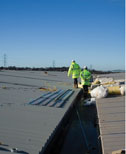ICC Evaluation Service (ICC-ES) LLC has developed guidelines for evaluating alternative asphalt shingles. These criteria provide an alternative to using ASTM D3462, "Standard Specification for Asphalt Shingles Made from Glass Felt and Surfaced with Mineral Granules," which is a requirement for fiberglass-reinforced asphalt shingles in the International Building Code® (IBC) and International Residential Code® (IRC).
If you are involved with the installation or design of asphalt shingle roof systems, I encourage you to be aware of these alternative provisions.
ICC-ES
ICC-ES is a nonprofit subsidiary of the International Code Council (ICC), which develops the IBC. ICC-ES provides technical evaluations of building products, components, methods and materials for use by manufacturers as evidence their products meet code requirements and warrant regulatory approval. ICC-ES' evaluations are particularly useful for evaluating products that may not comply with established standards, including evaluating new or innovative products, with the intent of complying with building codes.
AC438
ICC-ES originally published AC438, "Acceptance Criteria for Alternative Asphalt Roofing Shingles," in October 2011. The current version was published in March 2012.
Although AC438 has some similarities to ASTM D3462, it contains notable differences. AC438 is largely testing- and performance-based with minimal prescriptive, weight and measure requirements. ASTM D3462 is somewhat prescriptive and contains multiple weight and measure requirements, which tend to limit future asphalt shingle innovation and product development.
AC438 broadly defines alternative asphalt shingles as consisting of one or more layers of woven or nonwoven reinforcing felt impregnated and coated on both sides with asphalt and surfaced on the weathering side with mineral granules or an alternative surfacing that protects the asphaltic coating.
AC438 provides for a minimum Class C fire-rating classification and minimum Class D (90-mph) wind-resistance classification based on ASTM D7158, "Standard Test Method for Wind Resistance of Sealed Asphalt Shingles (Uplift Force/Uplift Resistance Method)."
ASTM D3462 provides for Class A fire-rating classification and a minimum Class A (60-mph) wind-resistance classification based on ASTM D3161, "Standard Test Method for Wind-Resistance of Asphalt Shingles (Fan-Induced Method)."
AC438 also includes accelerated weathering, breaking strength after accelerated weathering, wind-driven rain resistance and temperature-cycling testing not provided for in ASTM D3462.
Asphalt shingle products deemed by ICC-ES as complying with AC438 requirements are eligible to receive an evaluation report. ICC-ES evaluation reports include an ESR designation followed by a number and apply to the specific manufacturer's products indicated and conditions of use indicated in the report.
To date, GAF, Wayne, N.J., is the only manufacturer that has obtained an ICC-ES evaluation report based on AC438. The report, ESR-3267, applies to multiple products, which also comply with ASTM D3462.
Using evaluation reports
IBC's and IRC's alternative approval procedures allow building officials to accept products that do not explicitly meet code requirements provided they can be shown to meet the code's intent. An ICC-ES evaluation report is useful for this purpose.
When using an evaluation report for code compliance purposes, realize the code official's acceptance typically is granted on a project-specific basis and should not be considered a blanket approval for future projects.
Although GAF obtained ESR-3267, it does not appear the report is intended to substantiate code compliance because GAF products already comply with ASTM D3462 requirements. Instead, dual use of ASTM D3462 and AC438 appears to be intended to offer a means of differentiating these products from those complying with ASTM D3462 by incorporating AC438's additional test requirements.
At ASTM Committee D08's June meeting, NRCA asked the ASTM D3462 task force to consider incorporating AC438's additional test requirements into ASTM D3462. Whether changes will be made to ASTM D3462 remains to be seen; this likely will play out during the next several years.
Mark S. Graham is NRCA's associate executive director of technical services.



